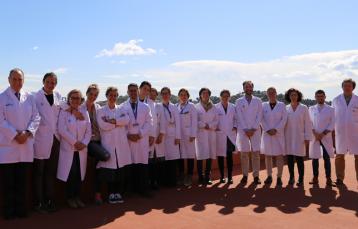A study where Vall d’Hebron participates analyses the risk genetic factors shared between ADHD and disruptive behaviour disorders
Comparteix aquest contingut
Related professionals
Dr. Josep Antoni
Ramos Quiroga
Ramos Quiroga
Dr. Josep Antoni
Ramos Quiroga
Ramos Quiroga
Lead Researcher
Psychiatry, Mental Health and Addictions
Psychiatrics
Dra. Gemma
Parramon Puig
Parramon Puig
Dra. Gemma
Parramon Puig
Parramon Puig
Dr. Marc
Ferrer Vinardell
Ferrer Vinardell
Dr. Marc
Ferrer Vinardell
Ferrer Vinardell
Sra. Mercedes
Rodríguez Fernández
Rodríguez Fernández
Sra. Mercedes
Rodríguez Fernández
Rodríguez Fernández
Nursing Supervisor
Dra. Amanda
Rodriguez Urrutia
Rodriguez Urrutia
Dra. Amanda
Rodriguez Urrutia
Rodriguez Urrutia
Dra. Vanesa
Richarte
Richarte
Dra. Vanesa
Richarte
Richarte
Sra. Marta
Perea Ortueta
Perea Ortueta
Dra. Maria Pilar
Lusilla Palacios
Lusilla Palacios
Dra. Maria Pilar
Lusilla Palacios
Lusilla Palacios
Sra. Anna
Beneria Gonzàlez
Beneria Gonzàlez
Dra. María Sonsoles
Cepeda Diez
Cepeda Diez
Dra. María Sonsoles
Cepeda Diez
Cepeda Diez
Dr. Jose A.
Navarro Sanchis
Navarro Sanchis
Dr. Jose A.
Navarro Sanchis
Navarro Sanchis
Sra. Marta
Sorribes Puertas
Sorribes Puertas
Dr. Christian
Fadeuilhe Grau
Fadeuilhe Grau
Dr. Christian
Fadeuilhe Grau
Fadeuilhe Grau
Dra. Mar
Ramos Gascon
Ramos Gascon
Dra. Mar
Ramos Gascon
Ramos Gascon
News and events


















